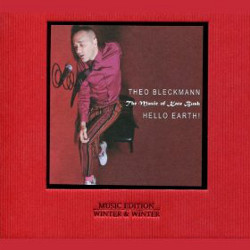Albums
Theo Bleckmann - Hello Earth! (The Music of Kate Bush) [Winter & Winter]
by J Hunter
May 14, 2012
Theo Bleckmann - Hello Earth! (The Music of Kate Bush) [Winter & Winter]
by J Hunter
May 14, 2012
|
|
|
|
 |
||
|
|
|
Jazz fans owe Brad Mehldau a big wet kiss: The monumentally talented pianist proved the world wasn't going to crack if you treated songs by Radiohead and Nick Drake with the same respect as pieces by George Gershwin and Cole Porter. As a result, the genre got itself a whole new world of "standards" to play with, and recent forays into that world have produced terrific tributes to Stevie Wonder, Sly Stone and David Bowie. Now vocalist Theo Bleckmann shines the jazz light on Kate Bush, and does it in a way that massively broadens the idiosyncratic singer/songwriter's takes on the highs and (mostly) lows of human relationships.
"Running Up that Hill" tells the story of a woman in love with a married man, and how she'd "make a deal with God" in a hot second to switch places with the man's wife. In the version that opens Hello Earth, Bleckmann flips the scene, making the protagonist a man in love with a married woman. And where Bush's original recording had the relentlessness of someone with an obsession worthy of Fatal Attraction, Bleckmann's take has the yearning and sadness of someone looking at a picture of somebody unreachable. "You don't want to hurt me," the protagonist sings to the object of his affection, but by saying that, his love has already stuck the knife in deep. Only in a closing section that represents momentary sex -- or, most likely, the memory of momentary sex -- is there any sense of hope or happiness.
Bush's imagery has always been vivid to the point of brutal, which is why she's never had more than a cursory presence on American radio. In her native UK, tracks like "Running," "Cloudbusting" and "The Man with the Child in His Eyes" were award-winning Top 10 hits. Bleckmann gives these tunes the righteous treatment they deserve: "Child" balances the love the protagonist feels for his partner with the knowledge of the crash that surely waits at the end of the relationship, while the martial beat on the chorus of "Cloudbusting" shows the strength the protagonist feels when he thinks, "Every time it rains/You're here in my head/Like the sun coming out/I know something good is gonna happen."
Bleckmann has a vocal range similar to Kurt Elling and Sachal Vasandani. However, aside from some rapid-fire scatting on "Saxophone Song," Bleckmann doesn't indulge in the vocal gymnastics of his contemporaries, relying instead on brilliant arrangements that mix studio wizardry with spot-on performances by keyboardist Henry Hay and guitarist/e-violinist Caleb Burhans. Bleckmann uses the blinking restlessness of "And Dream of Sheep" to lead us into a night in Dreamland Hell -- first suffocating us "Under Ice," and then assaulting us with a "Violin." Bush's biggest US hit was "Don't Give Up," her 1986 duet with Peter Gabriel; "Love and Anger" seems like an update on the couple in that song, still together but only linked by "a little piece of hope," and that link may not be enough.
Hello Earth hits hardest when Bleckmann leaves Bush's lyrics alone. The protagonist in "Suspended in Gaffa" repeats "I don't know why I'm crying," says "I'm much more alike the girl in the mirror," and he "opens up boxes that I am told not to." When Bush sings these lyrics, they're only the words of a troublemaker; when Bleckmann sings them, they're an examination of a developing sexuality, and all the questions that pose themselves whether other people want them to or not. "Child" goes down that same same-sex road, as we're told "Nobody knows about my man," and "He's very understanding/And he's so aware of my situation," taking the piece from another "other woman" song to a snapshot of a relationship that could either be a walk on the wild side or the discovery of something that was never known… or, at least, never acknowledged.
The worlds Kate Bush built are artfully crafted pieces of hard reality, light years away from the happy-go-lucky spaces Gershwin and Porter gave us many years before Bush was born. It took bravery and strength to bring these worlds into the jazz idiom, and Bleckmann's expressive treatments ripple with both those qualities. "Love and Anger" talks about "building a house of the future together," and the advancement of the "new standards" brings bright new light into the house of jazz.
new to state of mind
Shows: moe.
Shows: Yonder Mountain String Band
Shows: Grand Point North 2014
Shows: Catskill Chill 2014
Shows: moe.down 15
Shows: Gov't Mule
Shows: Umphrey's McGee
Shows: Newport Folk Festival 2014
Shows: Widespread Panic
Albums: Phish - Fuego
Shows: moe.
Shows: Yonder Mountain String Band
Shows: Grand Point North 2014
Shows: Catskill Chill 2014
Shows: moe.down 15
Shows: Gov't Mule
Shows: Umphrey's McGee
Shows: Newport Folk Festival 2014
Shows: Widespread Panic
Albums: Phish - Fuego
random awesomeness
Shows: Black Eyed Peas
Blog: Funky Monday: Herbie Hancock - "Hang Up Your Hang Ups"
Shows: Jamie Masefield and Doug Perkins
Shows: Wilco
Blog: Song of the Day: Kaki King - "Life Being What It Is"
Albums: This Frontier Needs Heroes - This Frontier Needs Heroes
Blog: Fela Kuti's Live In Detroit‚ 1986 is Coming
Shows: John Brown's Body
Shows: Jeff Coffin Mu'tet
Albums: Woods - At Echo Lake
Shows: Black Eyed Peas
Blog: Funky Monday: Herbie Hancock - "Hang Up Your Hang Ups"
Shows: Jamie Masefield and Doug Perkins
Shows: Wilco
Blog: Song of the Day: Kaki King - "Life Being What It Is"
Albums: This Frontier Needs Heroes - This Frontier Needs Heroes
Blog: Fela Kuti's Live In Detroit‚ 1986 is Coming
Shows: John Brown's Body
Shows: Jeff Coffin Mu'tet
Albums: Woods - At Echo Lake
